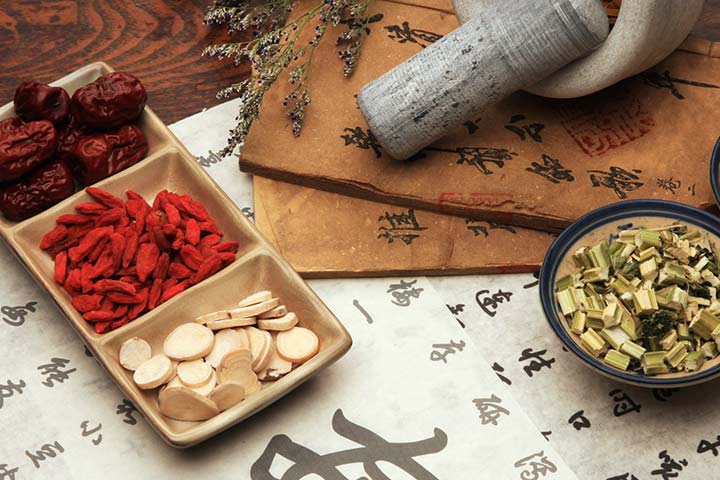You have to use Chinese language language herbs for hair progress you in all probability have hair loss. Evaluation reveals that Chinese language language herbs can induce hair progress (1), (2). These are good for serving to take care of hair loss, take care of discoloration of hair, and restore its pure pigmentation (3). Proper right here we now have compiled a list of 5 Chinese language language herbs which is able to assist forestall hair loss. Take a peek spherical.
Phrase: Sooner than using any herbs, please be certain you search the recommendation of alongside together with your doctor.
Chinese language language Pure Cures For Hair Loss You Would possibly Try
1. Fo-ti
Fo-ti might be probably the most typically used Chinese language language herb. It is also known as he-shou-wu. Fo-ti has been used for ages to take care of hair loss and baldness (4). It may really moreover help restore the pure pigmentation of hair and improve blood circulation.
2. Reishi Mushroom
The reishi mushroom is often utilized in hair tonics. It is also called lingzhi. It has antioxidant, antiviral, antimicrobial, and antibacterial properties (5), (6). It has anti-aging and anti-pigmentation properties which is able to help preserve hair healthful (6). It may really moreover defend hair from photodamage (6).
A mice analysis reveals that that reishi mushroom shows hair progress train and may be utilized to take care of alopecia (7).
One different analysis reveals that reishi mushroom accommodates 5-alpha-reductase inhibitors (8). 5-alpha-reductase is an enzyme that converts testosterone into DHT (Dihydrotestosterone). An increase throughout the ranges of 5-alpha-reductase will improve the levels of DHT, leading to hair loss. Reishi mushroom may additionally assist forestall this.
3. Nu Zhen Zi
This herb promotes the enlargement of black hair (9). It moreover has antiviral properties, which may help in promoting scalp nicely being and cleanliness. It moreover helps flush out toxins from the physique and strengthens the immune system. Nu-Shen-Zi will improve blood circulation to the scalp.
4. Wu Wei Zin
This herb is in fashion as a magnificence enhancer. It moreover serves as a tonic that helps purify the blood. Wu wei zin confirmed hair growth-promoting components in a analysis carried out on rats (10). It may really moreover help in the reduction of hair loss and cease photoaging (11).
5. Morus Albus
A analysis carried out in 2008 confirmed that morus alba stimulated hair progress in mice (12). Although there could also be not rather a lot human evaluation completed, there could also be a great deal of anecdotal proof that this herb helps forestall hair loss and premature graying of hair.
These Chinese language language herbs is likely to be typically used as a home therapy. The advantage of them is that they’re typically grown in your kitchen yard or as window sill crops.
The Chinese language language methodology of hair care follows the standard concepts of yin and yang to deal with the difficulty at its root. These herbs may be current in any native Chinese language language markets throughout the metropolis. Moreover, these shouldn’t very pricey and are sometimes supplied in easy-to-use sorts.
In case you’re experiencing hair loss and want to go for one factor pure, you have to use Chinese language language herbs for hair progress and restore your hair’s pure pigmentation. Chances are you’ll try using reishi mushrooms, morus albus, wu wei zin, or fo-ti to increase blood circulation and promote scalp nicely being. Analysis advocate that these Chinese language language herbs possess antimicrobial and antioxidant properties which will defend your hair from photodamage, decelerate premature graying hair, and cease hair loss. Chances are you’ll merely develop these Chinese language language herbs in your yard or you can go to your nearest native Chinese language language markets for these nice herbs.
Sources
Articles on StyleCraze are backed by verified data from peer-reviewed and tutorial evaluation papers, reputed organizations, evaluation institutions, and medical associations to verify accuracy and relevance. Check out our editorial protection for extra particulars.
- Lee, Chien‑Ying, et al. “Hair progress affect of typical Chinese language language medicine BeauTop on androgenetic alopecia victims: A randomized double-blind placebo-controlled medical trial.” Experimental and therapeutic medicine 13.1 (2017): 194-202.
https://www.ncbi.nlm.nih.gov/pmc/articles/PMC5245083/ - Shaoqiong, Xie. “Three Typical Dermatological Circumstances Dealt with by Dr. Li Yueping.” Journal of Standard Chinese language language Treatment, 2005.
http://www.journaltcm.com/modules/Journal/contents/tales/052/15.pdf - Leem, Jungtae et al. “Exploring the combo and modular traits of herbs for alopecia remedy in typical Chinese language language medicine: an affiliation rule mining and group analysis analysis.” BMC complementary and completely different medicine vol. 18,1 204.
https://www.ncbi.nlm.nih.gov/pmc/articles/PMC6030800/ - Patil, SM, et al. “Pure Medicines as an Environment friendly Treatment in Hair Loss – A Analysis.” Evaluation Journal of Pharmaceutical, Natural and Chemical Sciences.
https://pdfs.semanticscholar.org/711e/7d2615bcb44dbd77a143fd86a93f6bf02e55.pdf?_ga=2.28883391.2055899026.1584346573-967173808.1569477414 - Wachtel-Galor S, Yuen J, Buswell JA, et al. Ganoderma lucidum (Lingzhi or Reishi): A Medicinal Mushroom. In: Benzie IFF, Wachtel-Galor S, editors. Pure Treatment: Biomolecular and Medical Factors. 2nd model. Boca Raton (FL): CRC Press/Taylor & Francis; 2011. Chapter 9.
https://www.ncbi.nlm.nih.gov/books/NBK92757/ - Wu, Yuanzheng, et al. “Mushroom cosmetics: the present and future.” Cosmetics 3.3 (2016): 22.
https://www.researchgate.net/publication/305078746_Mushroom_Cosmetics_The_Present_and_Future - Ju, Bong Hyun, et al. “Outcomes of Ganoderma Lucidum extract ethanol extract and microneedle treatment system on hair progress in an alopecia model of C57BL/6N Mice.” The Journal of Pediatrics of Korean Treatment 28.2 (2014): 72-87.
https://www.researchgate.net/publication/274544158_Effects_of_Ganoderma_Lucidum_Extract_Ethanol_Extract_and_Microneedle_Therapy_System_on_Hair_Growth_in_an_Alopecia_Model_of_C57BL6N_Mice - Liu, Jie et al. “Building-activity relationship for inhibition of 5alpha-reductase by triterpenoids isolated from Ganoderma lucidum.” Bioorganic & medicinal chemistry vol. 14,24 (2006): 8654-60.
https://pubmed.ncbi.nlm.nih.gov/16962782/ - Pang, Zunting, et al. “The advances in evaluation on the pharmacological outcomes of Fructus Ligustri Lucidi.” BioMed evaluation worldwide 2015 (2015).
https://www.hindawi.com/journals/bmri/2015/281873/ - Kang, Jung-Il et al. “Promotion affect of Schisandra nigra on the enlargement of hair.” European journal of dermatology : EJD vol. 19,2 (2009): 119-25.
https://pubmed.ncbi.nlm.nih.gov/19153064/ - Lee, Hee Jung, et al. “Outcomes of Schisandra chinensis Turcz. fruit on contact dermatitis induced by dinitrofluorobenzene in mice.” Molecular medicine tales 12.2 (2015): 2135-2139.
https://www.spandidos-publications.com/mmr/12/2/2135 - Jung, Juyoung, Jaeyoung Park, and Hyeonsook Cheong. “Influence of Morus alba extract for hair progress promotion in C57BL/6 mouse.” Journal of the Chosun Pure Science 1.1 (2008): 19-23.
https://www.researchgate.net/publication/263631481_Effect_of_Morus_alba_extract_for_hair_growth_promotion_in_C57BL6_mouse
Related
The subsequent two tabs change content material materials beneath.
- Author
Anjali Sayee
Anjali focuses on hairstyles and hair and skincare and has written over 200 articles in these domains. Her philosophy… further

